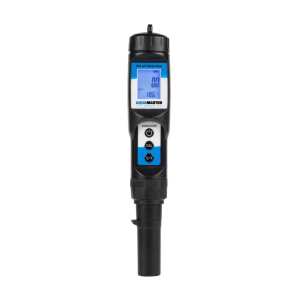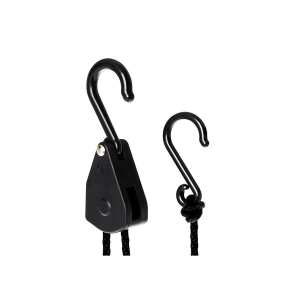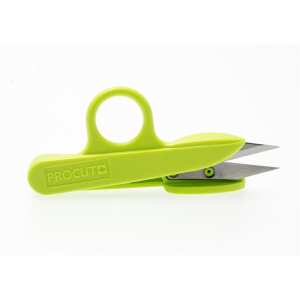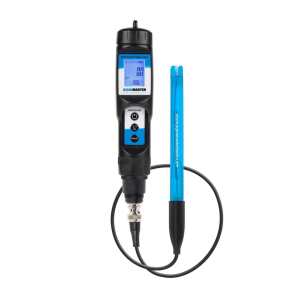Combi Meter P160 Pro (Set) by Aqua Master for Professional Users
The pre-calibrated Combi Meter P160 Pro by Aqua Master Tools from Holland impresses with its modern and robust design. It features analog EC calibration, which allows for calibration without deviations, even when the calibration solution is not at 25°C. EC calibration solutions are highly temperature-sensitive, unlike pH.
The electrode can be easily replaced when needed. The device comes with a case, calibration solutions, and batteries. It is perfect for measuring pH, EC, TDS, PPM, and temperature values of aqueous solutions such as nutrient solutions, swimming pool, tap, or pond water. Switching between different parameters is done with a simple button press.
How to Use the Combi Meter P160 Pro by Aqua Master Tools?
- Remove the protective cap.
- Clean the electrode thoroughly with distilled water and dry it.
- Press the power button to turn on the meter.
- Hold the meter vertically and immerse it in the solution up to the edge, allowing it to gently circulate. Wait for a few seconds until the values are displayed correctly on the screen.
- Use the Temp/CAL button to switch between temperature and Fahrenheit units.
- Use the PH/EC button to switch between pH and EC.
- To switch between the EC, TDS, and PPM parameters, the meter must be in EC mode. Then, press and hold the PH/EC button for at least 5 seconds to move to the next parameter.
- Rinse the electrode with water after use and press the power button to turn off the meter.
- Our electrodes are designed for dry storage, so there's no need to store them in liquid.
Technical Specifications of Combi Meter P160 Pro
Measurement Range
- pH: 0.1 ~ 14.0 pH
- EC: 0.0 ~ 19.9 mS/cm
- TDS: 0.0 ~ 19.99 PPT
- PPM: 0.0 ~ 1999 PPM
- Temp.: 0°C ~ 50°C (32°F ~ 122°F)
Resolution
- pH: ± 0.1 pH
- EC: 0.1 mS/cm
- TDS: 0.01 PPT
- PPM: 10 PPM
- Temp.: 0.1°C (1.0 ºF)
Measurement Accuracy
- pH: ± 0.1 pH
- EC: ± 2% F.S.
- TDS: ± 2% F.S.
- PPM: 10 PPM
- Temperature: ±0.5°C (32°F)
Other Features
- Temperature Compensation: 0°C - 50°C (32°F - 122°F)
- PPM Scale: 700 PPM
- pH Calibration: 2-Point Calibration with 4.0 and 7.0 pH
- EC Manual Calibration suitable for any EC buffer solution
- Features: Battery Indicator & Automatic Temperature Compensation
- Power Supply: 3 × 1.5 Volt AG-13 Button Cell
- Auto Shutdown: 8 Minutes
- Calibration Indicator: When Calibration is Correct
- Waterproof: IP67
- Dimensions: 220 x 40 x 40 mm
- Weight: 102 Grams
What Are the Benefits of a Combi Meter for pH, EC, TDS, PPM in Hydroponics?
A combi meter like the P160 Pro by Aqua Master Tools offers many advantages for hydroponic plant cultivation:
- First, it enables fast and precise monitoring of key water parameters such as pH, electrical conductivity (EC), total dissolved solids (TDS), particle concentration (PPM), and temperature (Temp). This is important to ensure that the nutrient solution is optimally adjusted for your plants. Incorrect pH or high EC concentration can lead to nutrient deficiencies or plant damage.
- Second, the combi meter can be used easily and conveniently. By cleaning the electrode with distilled water and setting the desired measurement parameters, you can quickly and reliably check water quality.
- Third, it saves time and resources since only one meter is needed for all different parameters. A combi meter is a practical and cost-effective solution, especially for smaller cultivation operations.
- Fourth, the combi meter allows for rapid response to changes in water parameters. Through regular measurements, you can quickly and efficiently respond to potential problems and adjust the nutrient solution composition with acids, bases, tap water, or fertilizers as needed.
Overall, a combi meter like the P160 Pro by Aqua Master Tools is a valuable tool for hydroponic plant cultivation, as it enables fast and precise monitoring of key water parameters, supporting optimal plant development.
Differences Between pH, EC, TDS, and PPM Values in Hydroponics
As a gardener or hydroponic enthusiast, you aim to create optimal growth conditions for your plants. To achieve this, it's important to control the chemical properties of water and nutrient medium, including four key measurements: pH, electrical conductivity (EC), total dissolved solids (TDS), and particle concentration (PPM).
pH Value: Indicator of the Acidity of the Irrigation Water
The pH value is a measure of the water's acidity. A pH value of 7 denotes a neutral solution. Values above are alkaline, while values below are acidic. Most plants prefer a slightly acidic to neutral pH range of 6.0 to 7.0. An unfavorable pH value can lead to certain nutrients becoming unavailable and poor plant growth.
EC: Measure of Concentration of Dissolved Salts
Electrical conductivity (EC) indicates how well a solution conducts electricity. It is a measure of the concentration of dissolved salts in the water and nutrient medium. A high EC value indicates many dissolved salts in the water, making many nutrients available. A low EC value, on the other hand, can lead to nutrient deficiencies.
TDS: Measure of Water Hardness
Total dissolved solids (TDS) indicates how many solids (salts, minerals, etc.) are dissolved in the water. A high TDS value can result in the water being "hard," making certain nutrients unavailable. A low TDS value can lead to the water being too soft and lacking sufficient nutrients.
PPM: Particle Concentration in Water
PPM stands for "parts per million" and refers to the concentration of dissolved particles in a solution. In hydroponics, this unit is used to measure the concentration of nutrients in the water solution that plants can use. A high PPM value may indicate overfertilization, leading to issues such as leaf burn, root damage, and reduced plant growth. A low PPM value, on the other hand, can result in plants not receiving enough nutrients, causing their growth to stagnate or slow down.
Temperature also affects the PPM value. High temperatures can cause nutrients to evaporate faster, reducing their concentration in the water. Lower temperatures can result in slower nutrient dissolution, leading to higher concentrations in the water. Therefore, it's important to monitor and adjust the temperature of the nutrient solution to ensure that the PPM value remains optimal.
What Is the Significance of the TDS Value in Hydroponic Plant Cultivation?
In hydroponics, the total dissolved solids (TDS) of the nutrient solution plays an important role in monitoring the nutrient content in the irrigation water. A high TDS value indicates a high concentration of dissolved minerals and salts, which can impact the growth of your plants. It's important to regularly measure the TDS value and adjust the irrigation water as needed.
What Is the TDS Value?
The TDS value is a measure of the concentration of dissolved minerals and salts in the water. It is expressed in milligrams per liter (mg/L) or in parts per million (ppm). A high TDS value can indicate overfertilization or the use of unsuitable tap water.
What Role Does Tap Water Play in Hydroponics?
In hydroponics, tap water is often used for watering plants. However, it's important to note that tap water often contains a high concentration of chlorine and other substances.
An unfavorable TDS value in the hydroponic system can have negative effects on plants. Here are some possible impacts:
-
Overfertilization: A high TDS value can inhibit plant growth because it indicates an excess of nutrients in the water. This can stress plants and lead to their demise.
-
Insufficient Nutrient Uptake: A low TDS value can result in a lack of nutrients in the hydroponic system. Since plants absorb nutrients from the water, a nutrient deficiency can cause plants to grow slowly or even die.
-
Uneven Growth: An unfavorable TDS value can also lead to uneven growth. Plants that absorb too many or too few nutrients may grow unevenly, resulting in irregular size and shape.
-
Flavor Impairment in Food Plants: If TDS values in the hydroponic system are not within the optimal range, it can also affect the taste of food plants.
Included in the Package:
- 1 x Combo Pen P160 Pro
- 1 x Sturdy Case
- 1 x Calibration Solutions pH 7.00 25 ml
- 1 x Calibration Solutions pH 4.01 25 ml
- 1 x Calibration Solutions EC 14.13 25 ml
- 1 x Calibration Screwdriver
- 1 x User Manual (NL - EN - DE)





















